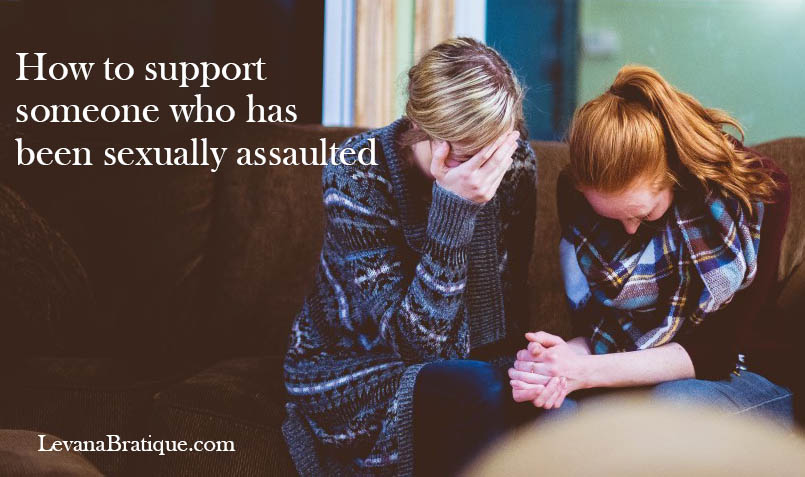How to Support Someone Who Has Been Sexually Assaulted
9th Apr 2019

April is Sexual Assault Awareness and Prevention Month, so let’s take a moment to talk about a heavy, but important topic.
Sexual assault is a violent act that strips away a person’s sense of dignity, autonomy, and control- it is devastating to a person’s most inner and personal self. Sexual assault can include rape, attempted rape, unwanted sexual touching, or forced or coerced sex acts. We have a societal notion that only women can be assaulted, but women, men, trans people, and people of all genders and ages can be violated. One thing, however, remains the same: it’s never the victim’s fault.
While sexual violence has fallen by more than half since 1993, 1 out of every 6 American women has been the victim of an attempted or completed rape in her lifetime. That means that most of us either know, or are, someone who has or will experience it. If someone you love tells you they have been sexually assaulted, here are some ways of showing support:
• Don’t judge. When someone you care about is hurting, you may feel powerless and unsure how to help. It can be tempting to want to take charge, but the best thing you can do is to listen to them without judgement, and offer your unwavering support.
• Reassure them it was not their fault. Most survivors fear they won’t be believed, or they were somehow to blame for the assault. Whatever the circumstances were, they were not looking to be assaulted. The blame rests solely on the assailant. If you find yourself struggling to know what to say, RAINN (Rape, Abuse, and Incest National Network) offers some specific phrases that can be supportive through a survivor’s healing process.
• Ask what they need, and encourage them to seek help. The most time-sensitive step is to seek medical attention. Evidence can only be collected at that time, but the decision to file a police report or press charges can be made later. The hospital will keep the evidence, so bring a change of clothes if you can. You may feel very strongly that your loved one seek help from a healthcare professional, but remember, you can’t force them to do what you think is best. Help them to explore all of their options, but let them make the decision on how they would like to proceed. If the survivor seeks medical attention or plans to report, offer to be there. Your presence can offer the support they need. The National Sexual Assault Hotline 800.656.HOPE (4673) and RAINN's confidential online chat can provide 24/7 support and help you find local resources.
• Continue to be there. Everyone grieves and heals at a different rate; there is no perfect linear timeline or right or wrong way, especially when dealing with trauma. There are many common reactions, including:
• A feeling of being isolated and alone and out of touch with the rest of the world.
• A belief that no one understands what they are experiencing.
• Physical symptoms such as headaches, nausea, stomach aches, loss of appetite, fatigue.
• A feeling of being dirty.
• Emotional reactions such as shame, guilt, anger, rage, fear.
• Not being able to stop thinking about the assault.
• Feeling responsible for the assault.
• An unwillingness to be touched by anyone.
• Feeling unsafe when alone.
Sexual assault is a shattering experience, which can take years to recover from. In the weeks and months ahead, continue to let them know that you are there and available to listen. If they’ve expressed interest in seeing a mental health counselor but are too overwhelmed to take that step, offer to research some therapists who specialize in trauma. Encourage them to practice good self-care.
• Take care of yourself. Caring for the raw emotions of a loved one who has survived a trauma can be exhausting. You’ll probably feel some powerful emotions yourself, including anger, sadness, frustration, or guilt. Talk to someone if you need to, and be sure you are practicing good self-care yourself.
Further Resources:
Steps you can take after sexual assault, including receiving medical care
Survivor stories
Talking with children and teens about sexual assault
Many survivors of assault are too ashamed to report it. Here are some tips on recognizing warning signs for college age adults, teens, and young children.
Anyone affected by sexual assault, whether it happened to you or someone you care about, can find support on the National Sexual Assault Hotline at 800.656.HOPE. You can also visit RAINN online to receive support via confidential online chat.
In the Pittsburgh area, contact Pittsburgh Action Against Rape or Center for Victims for support. If you live outside of Pittsburgh, to search for your local sexual assault service provider, click here.
If someone you care about is considering suicide, learn the warning signs, and offer help and support. For more information about suicide prevention visit the National Suicide Prevention Lifeline or call 800.273.TALK (8255) any time, day or night.

